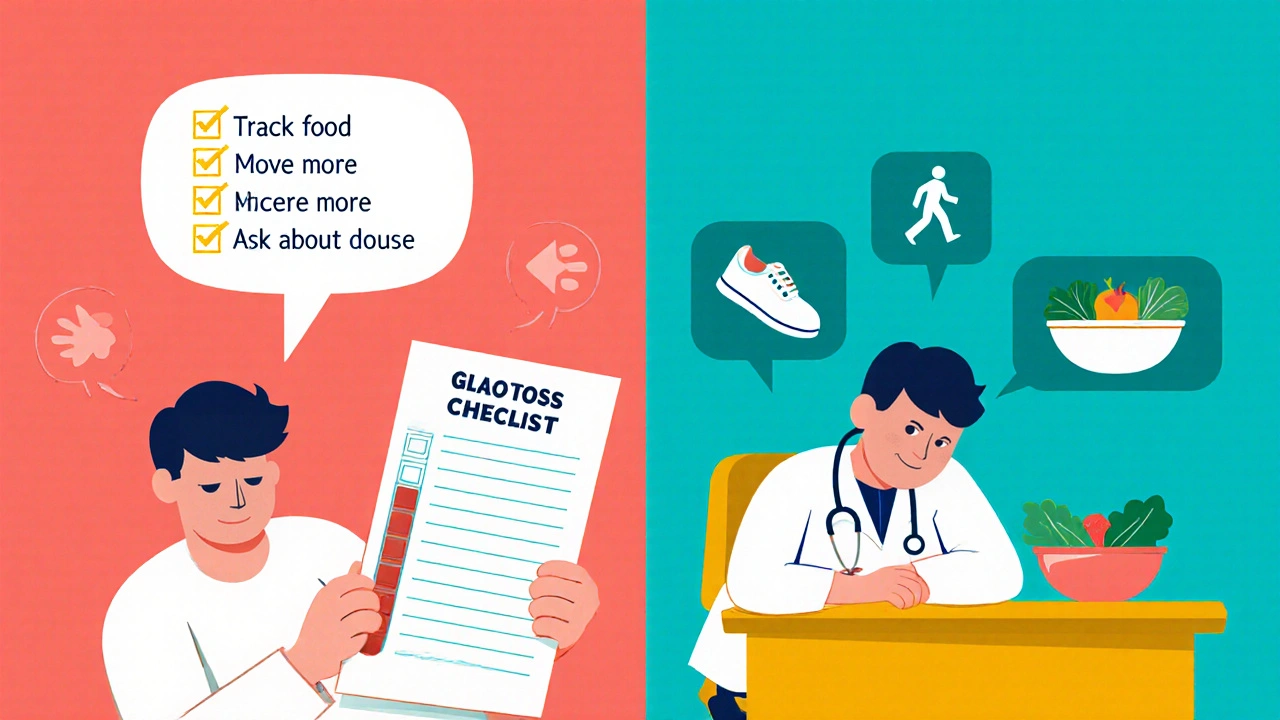Many people start taking oxcarbazepine to control seizures or nerve pain, only to notice the scale creeping up over time. It’s not just in your head-weight gain is a real and common side effect. If you’ve been on this medication for a few months and feel like your clothes are tighter, you’re not alone. But here’s the good news: it’s not inevitable, and there are clear ways to manage it.
Why Does Oxcarbazepine Cause Weight Gain?
Oxcarbazepine works by calming overactive nerve signals in the brain, which helps stop seizures and reduce trigeminal neuralgia pain. But that same mechanism can mess with your appetite, metabolism, and fluid balance. Unlike some older seizure drugs like valproate that directly trigger fat storage, oxcarbazepine’s weight gain is more subtle. Studies show about 10-20% of adults on oxcarbazepine gain at least 5% of their body weight within the first year. In kids, the numbers are even higher-up to 30% in some trials.
The main culprits? Increased hunger and slower metabolism. The drug can raise levels of ghrelin, the hormone that makes you feel hungry, while lowering leptin, the one that tells you you’re full. Some people also notice their body holds onto more water, especially in the first few weeks. That’s not fat, but it still shows up on the scale.
How Much Weight Do People Typically Gain?
There’s no single answer-some people gain nothing, others gain 10-20 pounds. A 2023 study in the Journal of Neurology followed 412 adults on oxcarbazepine for 12 months. The average weight gain was 4.3 pounds, but the top 25% gained over 11 pounds. Kids in the same study gained more on average: 7.2 pounds, with some gaining over 20 pounds.
It’s not just about the number on the scale. Many patients report feeling bloated, sluggish, or more tired than usual. These symptoms often get mistaken for the condition being treated, not the medication causing them.
Who’s Most at Risk?
Not everyone gains weight on oxcarbazepine. But certain factors make it more likely:
- Younger age-Children and teens are more sensitive to the appetite-stimulating effects.
- Higher starting dose-Doses above 1200 mg/day are linked to greater weight gain.
- Longer treatment time-Most weight gain happens in the first 6 months, but it can keep creeping up.
- Existing metabolic issues-If you already have insulin resistance, prediabetes, or a family history of obesity, your risk goes up.
- Combining with other meds-Taking oxcarbazepine with antidepressants like amitriptyline or antipsychotics like quetiapine increases the chance of weight gain.
If you’re on multiple medications and starting to notice changes, talk to your doctor about whether one of them might be the main driver.

What Can You Do About It?
Stopping oxcarbazepine isn’t always an option-especially if it’s controlling your seizures. But you don’t have to just accept the weight gain. Here’s what actually works:
- Track your food-Use a simple app like MyFitnessPal for just 2 weeks. Most people are shocked by how many extra snacks or sugary drinks they’re consuming. Oxcarbazepine can make you crave carbs, especially in the afternoon. Recognizing those patterns is the first step.
- Swap high-calorie snacks-Instead of chips or cookies, keep nuts, Greek yogurt, or hard-boiled eggs handy. Protein and fiber help you feel full longer.
- Move more, even a little-You don’t need to run a marathon. A 20-minute walk after dinner cuts evening cravings and helps regulate blood sugar. Studies show even light daily activity reduces medication-related weight gain by up to 40%.
- Watch your fluids-Drink water instead of juice or soda. Dehydration can make you feel hungrier than you are. Aim for at least 8 cups a day.
- Ask about dose timing-Some people find taking oxcarbazepine with food reduces appetite spikes. Others do better splitting the dose-half in the morning, half at night-to avoid nighttime hunger.
One patient in Perth, 34, started gaining 2 pounds a month after switching from lamotrigine to oxcarbazepine. She started walking 30 minutes every evening and swapped her afternoon candy bar for a handful of almonds. In three months, she lost 6 pounds and felt more energetic. Her neurologist didn’t change her dose-she just changed her habits.
When Should You Talk to Your Doctor?
Don’t wait until you’ve gained 20 pounds. If you notice:
- Weight gain of more than 5% of your body weight in 3 months
- Increased thirst or frequent urination (could signal blood sugar issues)
- Extreme fatigue or swelling in your legs
- Feelings of depression or low self-esteem because of the weight
These are signs to schedule a check-up. Your doctor can test your blood sugar, thyroid levels, and hormone balance. Sometimes, a small change-like switching to topiramate or adding metformin-can help without losing seizure control.
Alternatives to Oxcarbazepine
If weight gain is a major concern and you’re still trying to find the right medication, here are some alternatives with lower risk:
| Medication | Typical Weight Change | Notes |
|---|---|---|
| Oxcarbazepine | Weight gain in 10-20% | Common, especially in kids; appetite increase |
| Lamotrigine | Neutral or slight loss | Often preferred if weight is a concern |
| Topiramate | Weight loss in 15-25% | Can suppress appetite; may cause kidney stones |
| Levetiracetam | Neutral | Minimal effect on weight; good for teens |
| Valproate | Significant gain in 40-60% | Strongest link to weight gain; avoid if possible |
Switching meds isn’t always easy. It takes weeks to adjust, and there’s always a risk of breakthrough seizures. But if weight gain is affecting your health or mental well-being, it’s worth discussing with your neurologist.

Long-Term Health Risks
Weight gain from oxcarbazepine isn’t just about appearance. Over time, it can increase your risk of:
- High blood pressure
- Insulin resistance and type 2 diabetes
- Sleep apnea
- Joint pain and reduced mobility
One 2024 study in Epilepsy & Behavior found that patients on oxcarbazepine for over 2 years had a 35% higher chance of developing prediabetes compared to those on lamotrigine. That’s not a reason to panic-but it is a reason to monitor your health closely.
Get your fasting glucose and HbA1c checked every 6-12 months if you’re on this medication long-term. Early detection means you can make changes before it turns into a bigger problem.
Real Talk: It’s Not Your Fault
Some people blame themselves for gaining weight. They think they’re not trying hard enough. But this isn’t about willpower. Oxcarbazepine is changing your body’s chemistry. You’re not lazy. You’re not failing. You’re just dealing with a side effect that’s poorly understood and rarely discussed.
The best thing you can do is be proactive. Track your weight. Talk to your doctor. Adjust your diet and movement. And don’t let guilt stop you from asking for help. Many people feel ashamed to bring it up-but your doctor has seen this a hundred times. They can help you find a solution.
What to Do Next
If you’re on oxcarbazepine and worried about weight:
- Write down your weight every week for a month.
- Keep a simple food log for 7 days-no judgment, just facts.
- Make a list of your top 3 cravings and find healthier swaps.
- Book a 15-minute appointment with your doctor to discuss your concerns.
- Ask if a blood test for glucose and thyroid function is needed.
You don’t have to accept weight gain as part of the deal. With the right strategy, you can stay in control of your health while still managing your seizures.
Does oxcarbazepine cause weight gain in everyone?
No, not everyone gains weight. About 10-20% of adults and up to 30% of children experience noticeable weight gain. Some people see no change at all. It depends on your genetics, metabolism, dose, and lifestyle.
How soon after starting oxcarbazepine does weight gain start?
Most weight gain happens in the first 3 to 6 months. Some people notice increased hunger or bloating within the first few weeks. If you haven’t gained weight by 6 months, you’re unlikely to gain much more from the drug alone.
Can I lose the weight while still taking oxcarbazepine?
Yes. Many people successfully lose weight by adjusting their diet, increasing physical activity, and managing cravings. Weight loss doesn’t require stopping the medication-just changing daily habits. A 2022 study showed that patients who followed a structured nutrition plan lost an average of 8 pounds over 6 months while staying on oxcarbazepine.
Is topiramate better than oxcarbazepine for avoiding weight gain?
Topiramate often leads to weight loss instead of gain, making it a better choice if weight is a major concern. But it can cause side effects like brain fog, tingling, or kidney stones. The decision depends on your seizure type, tolerance, and overall health. Talk to your neurologist about whether switching makes sense for you.
Should I stop oxcarbazepine if I’m gaining weight?
Never stop suddenly. Stopping oxcarbazepine without medical supervision can trigger seizures or worsen nerve pain. If weight gain is a problem, work with your doctor to adjust your plan. You might switch meds, lower your dose, or add lifestyle changes. But always do it under medical guidance.
Managing weight on oxcarbazepine isn’t about perfection-it’s about awareness and small, consistent changes. You’re not stuck. You have more control than you think.



November 17, 2025 AT 00:07 AM
Oh wow, another miracle drug that turns you into a human burrito. Guess I should’ve known when the pill looked like a tiny beige pancake. My clothes are now classified as "art installations." 😭
November 17, 2025 AT 07:50 AM
I’m so glad someone finally put this into words 🥹✨ I went from "fit in my jeans" to "I need a new wardrobe budget" in 4 months. But hey - at least my aura is now *vibing* with comfort food energy 🍕🥑🧘♀️
November 17, 2025 AT 13:40 PM
Weight gain is common. Track food. Walk more. Drink water. Talk to doctor.
November 17, 2025 AT 18:54 PM
This isn’t failure. This is biology speaking louder than willpower. Your body isn’t betraying you - it’s adapting to a chemical shift. The real victory? Not giving up. Not hiding. Not blaming yourself. You’re still here. Still fighting. That’s strength no scale can measure.
November 18, 2025 AT 21:34 PM
I felt this in my soul. I gained 12 lbs and thought I was just lazy. Turns out, my brain was just screaming for carbs like a toddler at a candy store. The almond swap? Game changer. Also, walking after dinner feels like a tiny rebellion against my own metabolism.
November 19, 2025 AT 14:05 PM
Wait so you’re telling me I’m not just a fat slob? I thought I was just eating too much pizza. So this drug is literally making me hungry? Like… on purpose?
November 20, 2025 AT 01:52 AM
This is all a lie. Big Pharma paid them to write this. They don’t want you to know oxcarbazepine is just a Trojan horse for the obesity-industrial complex. They’re replacing your hormones with synthetic hunger. Look at the numbers - it’s all connected to 5G and fluoride. You’re being manipulated.
November 20, 2025 AT 11:00 AM
i read this and thought 'wow' then i looked at my snack drawer and thought 'oh no' lol. i thought i was just bad at life. turns out my brain is just a hungry ghost with a prescription. thanks for the non-judgy info.
November 21, 2025 AT 00:08 AM
There’s something profoundly human about this. We’re taught to equate discipline with worth, but what if your body is just responding to chemistry like a plant to sunlight? You’re not broken - you’re biochemically responsive. That’s not weakness. That’s biology being beautifully, frustratingly complex. And honestly? The fact you’re reading this means you’re already doing better than most.
November 22, 2025 AT 08:31 AM
I’ve been on this for 18 months. Gained 15 lbs. Started doing 20-min walks after dinner - no fancy gear, just sneakers. Lost 8 lbs without changing meds. Also swapped soda for sparkling water with lime. Small things. Big difference. Don’t overcomplicate it.
November 22, 2025 AT 13:41 PM
You’re not alone. You’re not lazy. You’re not failing. You’re managing a complex medical situation while your body is being quietly rewritten by a pill. That takes courage. And if you’re reading this, you’re already doing the hard work - just by asking questions. Keep going. You’ve got this. 💪❤️
November 22, 2025 AT 23:16 PM
The metaphysical weight of pharmacological side effects is often overlooked. We speak of bodies as machines, yet here we are - altered by molecules we cannot see, governed by hormonal whispers we cannot hear. Is this gain, or is it transformation? And who gets to define the line between healing and surrender?
November 23, 2025 AT 18:52 PM
I’m from India and my neurologist didn’t even mention weight gain as a side effect. I gained 18kg in 8 months and thought it was stress. Now I’m doing yoga daily and eating more dal and veggies. It’s not easy, but I’m trying. To anyone else on this med - you’re not broken. You’re just learning how to live with a new kind of rhythm. One meal, one step at a time. You’re doing better than you think.